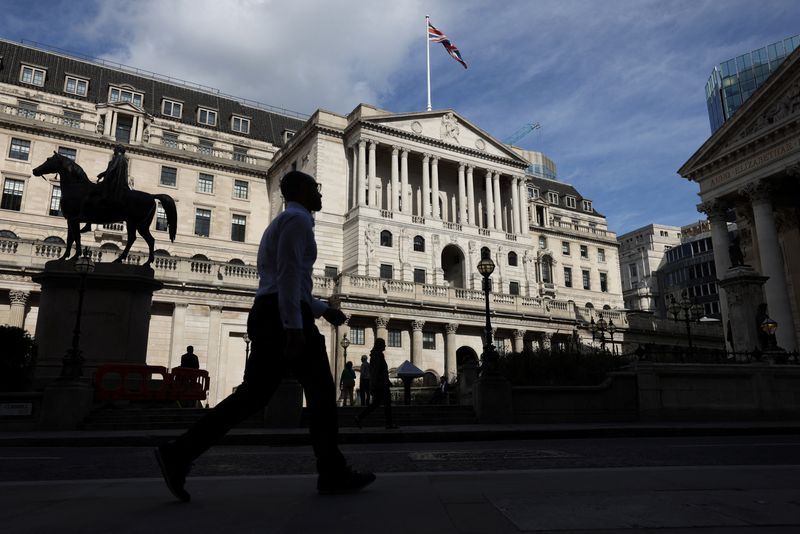By David Milliken
LONDON (Reuters) -The Bank of England is starting work on its first facility to lend to insurers and pension funds to help avoid a repeat of last year's bond market turmoil, Andrew Hauser, the BoE's executive director for markets, said on Thursday.
The BoE has a long-standing range of tools to lend to banks which have good-quality collateral if they struggle to get ready cash during times of market stress.
However, there is no equivalent for non-bank financial institutions (NBFIs), forcing the BoE to take one-off measures a year ago after former Prime Minister Liz Truss' "mini-budget" and at the start of the COVID-19 pandemic in 2020.
"We will be embarking, with immediate effect, on the design of a facility allowing us to lend to insurance company and pension funds - including newly-resilient LDI funds," Hauser said at an event hosted by MNI Connect.
These financial institutions are big holders of British government bonds which usually can be readily exchanged for cash but suffer from shortages of buyers at times of market turmoil.
"The impetus for this work is real and pressing: NBFIs have introduced important new sources of systemic risk, and our current toolkit - though effective - is incomplete, Hauser said.
Globally, NBFIs - sometimes called "shadow banks" and which include investment firms including hedge funds - represent about half of the financial sector and have expanded rapidly since the 2008 financial crisis.
Lending to banks during past crises did not always find its way to NBFIs facing liquidity issues, and buying and selling assets directly posed financial and policy risks to the BoE, Hauser said.
The BoE last year bought 19.3 billion pounds ($23.5 billion)of long-dated and inflation-linked gilts from liability-driven investment (LDI) funds used by pension providers, after bond prices slumped following Truss' mini-budget. These bonds have since been sold back to the market at a profit.
However, the timing was awkward for the BoE, coming just as inflation hit a 41-year high of 11.1% and forcing it to delay the start of active bond sales from its separate quantitative easing portfolio.
Hauser said the BoE would look at expanding the lending facility to a wider range of non-banks over time but warned that the programme was not aimed at reducing financial firms' need to guard against day-to-day risks.
"It is central banks' job to protect the system against genuine threats to stability. But it is firms' job to protect themselves against a wide range of less severe shocks, and we cannot afford to conflate the two," he said.
Regulators globally and in Britain are already considering tighter liquidity rules for "non-banks" to cope better with market shocks and minimise the need for central bank help in the first place.
Even for insurers and pension funds, designing a suitable facility would be a challenge, Hauser said. There were thousands of firms that might potentially need help, compared with fewer than 230 banks covered by existing BoE lending facilities.
Many of these non-bank financial firms might face legal challenges borrowing from the BoE, or lack the internal capacity to manage the financial risks.
($1 = 0.8202 pounds)
